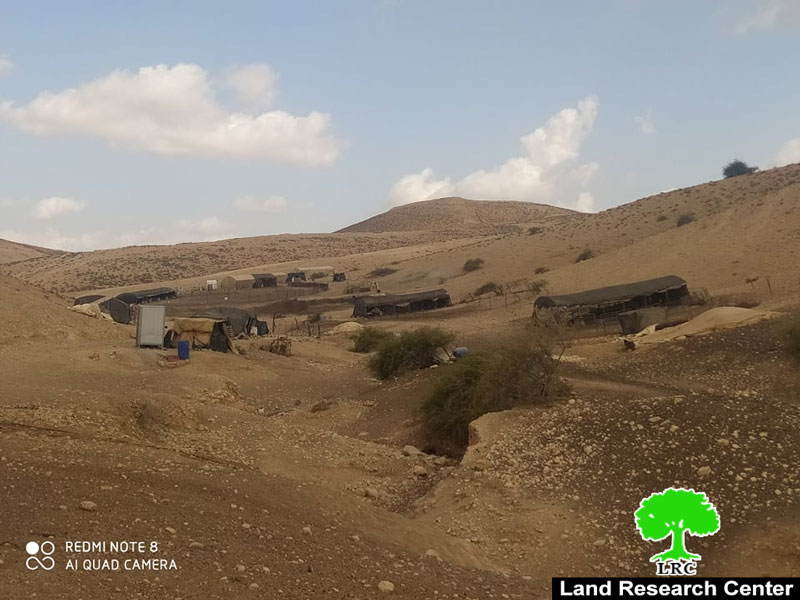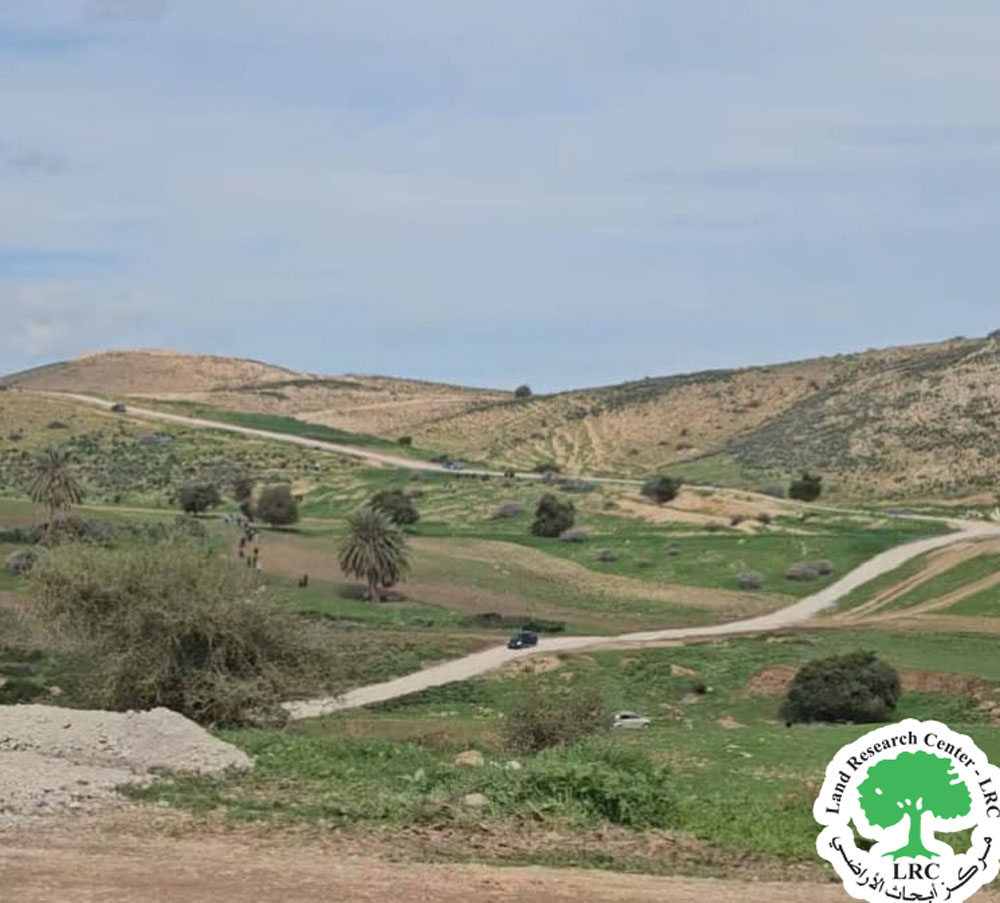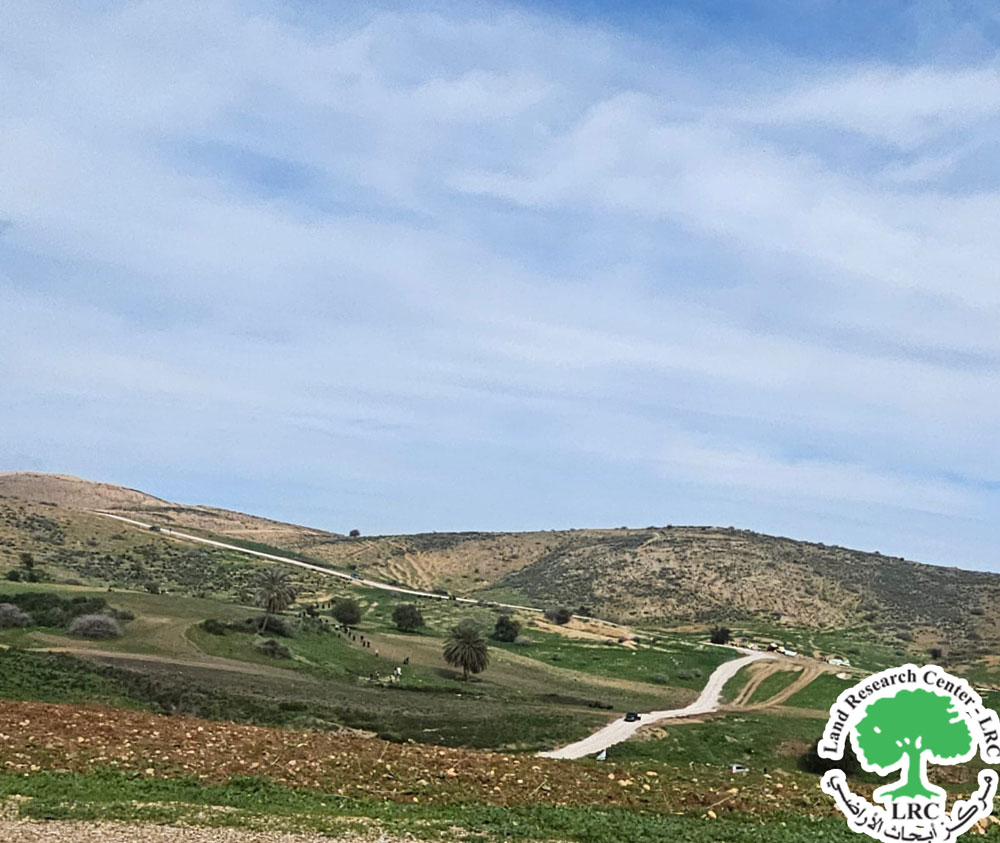مستعمرون يشقون طريقاً يخدم البؤرة الاستعمارية في منطقة " أم الجمال" / محافظة طوباس
- الانتهاك: شق طريق استعماري جديد.
- الموقع: خربة أم الجمال في الأغوار الشمالية.
- تاريخ الانتهاك: 14/02/2025.
- الجهة المعتدية: مجموعة من المستعمرين.
- الجهة المتضررة: مزارعي واد المالح.
- تفاصيل الانتهاك:
شرع المستعمرون مع حلول ساعات الصباح الباكر من يوم الجمعة الموافق (14/2/2025) بشق طريق استعماري يربط بين البؤرة الاستعمارية المقامة في منطقة أم الجمال والطريق الاستعماري الرابط في المنطقة، والذي يخدم مجموعة من المستعمرات القائمة هناك، على رأسها مستعمرتا "مسكيوت" و"روتم".
يُذكر أن الطريق الجاري تنفيذه يبلغ طوله ما يقارب 900 متر بعرض أربعة أمتار، حيث يصل مباشرة الى البؤرة الاستعمارية التي تم إنشائها في تشرين ثاني 2024، مما يهدد بالسيطرة على أكبر مساحة ممكنة من الأراضي الزراعية والرعوية.
كما رصد فريق البحث الميداني في مركز أبحاث الأراضي، في وقت لاحق، تحديدًا في نهاية شهر تشرين الثاني من العام 2024، قيام المستعمرين بوضع ثلاث وحدات سكنية متنقلة على أراضٍ وقفية تابعة للبطريركية في منطقة أم الجمال، بعد أن هجّر المستعمرون تجمع " أم الجمال" الفلسطيني قسراً من مكان سكنهم وتهجيرهم باتجاه قرية بردلة القريبة، وذلك تمهيداً لإنشاء تلك البؤرة الاستعمارية الجديدة في منطقة أم الجمال، حيث بدأت بوضع عدد من الكرفانات واليوم تتطور ويتم شق طريق استعماري ليتم شرعنتها كمستعمرة وليس كبؤرة فيما بعد كما يحدث مع مثيلاتها من البؤر وهذه سياسة ممنهجة يتبعها الاحتلال الاسرائيلي.
من جهته، أفاد السيد مهدي دراغمة، رئيس تجمع المالح، لباحث مركز أبحاث الأراضي:
"إن ما يجري هو استكمال لتهجير المواطنين الفلسطينيين وتثبيت تلك البؤرة الاستعمارية التي أُقيمت حديثاً، حيث إن الطريق الذي قام المستعمرون بتنفيذه يمر بالقرب من نبع أم الجمال، وهذا يعني سيطرة المستعمرين على النبع بشكل كامل، ومن غير المستبعد بعد شق هذا الطريق أن يسعى المستعمرون إلى توسيع تلك البؤرة لاحق، بل وشرعنتها بالكامل لتصبح مستعمرة جديدة في قلب الأغوار الشمالية".
يُشار إلى أن ما قام به المستعمرون جاء بعد تهجير سكان تجمع أم الجمال، وغالبيتهم من عرب الكعابنة، حيث رصد الباحث الميداني في العام 2024 عمليات التهجير الكبيرة لسكان التجمع، مع الإشارة إلى أنه تم هدم التجمع عدة مرات في الأعوام 2012 و2014 و2015.
الصورة أعلاه تجمع أم الجمال قبل ترحيله
وفي نظرة تاريخية إلى منطقة أم الجمال، نرى أن للمنطقة طابعاً تاريخياً هاماً منذ سنوات طويلة، حيث تعكس المعالم التاريخية التي تزين المنطقة، بالإضافة إلى النبع المائي القائم فيها، بشكل قطعي أهمية هذه المنطقة التي كانت حتى فترة ليست ببعيدة مقصدًا مهمًا للمزارعين ومربي الماشية. ولكن في ظل التوسع الاستعماري، قام المستعمرون بالاستيلاء على الموقع وطرد السكان الفلسطينيين منه، واليوم يبدأ المستعمرون عجلة التهويد اليومي للمنطقة.
مصادرة الارض مخالف للقوانين الدولية :
إن ما تقوم به إسرائيل في الأراضي الفلسطينية المحتلة يعتبر انتهاكا لحقوق الشعب الفلسطيني وأراضيه وانتهاكا للقوانين والأعراف الدولية، وفيما يلي أهم النصوص الواردة في القوانين والمعاهدات الدولية التي تحظر الاستيطان الاسرائيلي في الاراضي الفلسطينية وتمنع المساس بالحقوق والأملاك المدنية والعامة في البلاد المحتلة وقرارات الأمم المتحدة ذات العلاقة.
اتفاقية لاهاي/ 1907:-
- المادة 46: الدولة المحتلة لا يجوز لها أن تصادر الأملاك الخاصة.
- المادة 55: الدولة المحتلة تعتبر بمثابة مدير للأراضي في البلد المحتل، وعليها أن تعامل ممتلكات البلد معاملة الأملاك الخاصة.
معاهدة جنيف الرابعة/ 1949
- المادة 49: لا يحق لسلطة الاحتلال نقل مواطنيها إلى الأراضي التي احتلتها، أو القيام بأي إجراء يؤدي إلى التغيير الديمغرافي فيها.
- المادة 53: لا يحق لقوات الاحتلال تدمير الملكية الشخصية الفردية أو الجماعية أو ملكية الأفراد أو الدولة أو التابعة لأي سلطة في البلد المحتل.
- المادة 147: ان تدمير واغتصاب الممتلكات علي نحو لا تبرره ضرورات حربية وعلي نطاق كبير بطريقة غير مشروعة وتعسفية هو مخافة جسيمة.
تقارير ذات صلة:
إنشاء بؤرة استعمارية في منطقة " أم الجمال" في الأغوار الشمالية / محافظة طوباس
ضمن سياسة التهجير القسري ... مستعمرون يجبرون تجمع " أم الجمال" البدوي على النزوح من مكان سكناهم في واد المالح / محافظة طوباس
مشروع: حماية الحقوق البيئية الفلسطينية في مناطق "ج" SPERAC IV - FCDO
Disclaimer: The views and opinions expressed in this report are those of Land Research Center and do not necessarily reflect the views or positions of the project donor; the Norwegian Refugee Council.
إخلاء المسؤولية: الآراء ووجهات النظر الواردة في هذا التقرير هي آراء ووجهات نظر مركز أبحاث الأراضي ولا تعكس بالضرورة وجهات نظر أو مواقف الجهة المانحة للمشروع؛ المجلس النرويجي. للاجئين
الطريق الذي شقه المستعمرون



